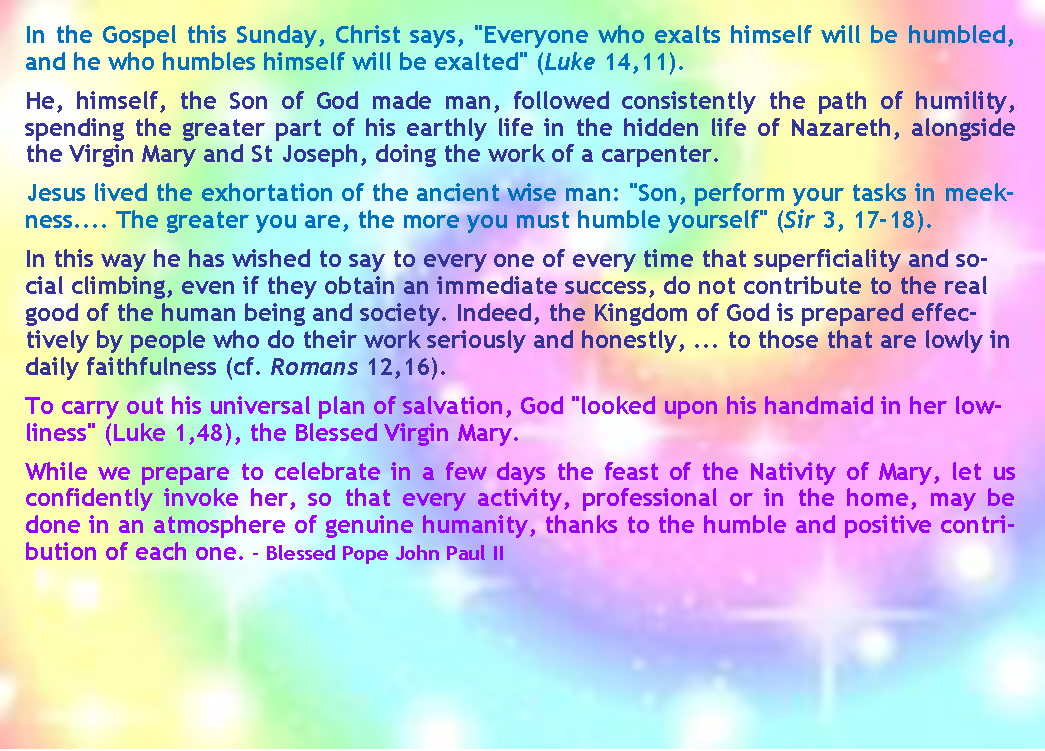|
48 |


|
Extracted from the book of Ecclesiasticus /Sirach 3:19-21,30-31: My son, be gentle in carrying out your business, and you will be better loved than a lavish giver. The greater you are, the more you should behave humbly, and then you will find favour with the Lord; for great though the power of the Lord is, he accepts the homage of the humble. There is no cure for the proud man’s malady, since an evil growth has taken root in him. The heart of a sensible man will reflect on parables, an attentive ear is the sage’s dream. |

|
Extracted from Psalm 68:4-7,10-11: In your goodness, O God, you prepared a home for the poor.
But the just shall rejoice at the presence of God, they shall exult and dance for joy. O sing to the Lord, make music to his name; rejoice in the Lord, exult at his presence. Father of the orphan, defender of the widow, such is God in his holy place. God gives the lonely a home to live in; he leads the prisoners forth into freedom, but rebels must live in arid land.
You poured down, O God, a generous rain: when your people were starved you gave them new life. It was there that your people found a home, prepared in your goodness, O God, for the poor. |

|
Extracted from the Sermon - Hebrews 12:18-19,22-24: What you have come to is nothing known to the senses: not a blazing fire, or a gloom turning to total darkness, or a storm; or trumpeting thunder or the great voice speaking which made everyone that heard it beg that no more should be said to them. But what you have come to is Mount Zion and the city of the living God, the heavenly Jerusalem where the millions of angels have gathered for the festival, with the whole Church in which everyone is a ‘first-born son’ and a citizen of heaven. You have come to God himself, the supreme Judge, and been placed with spirits of the saints who have been made perfect; and to Jesus, the mediator who brings a new covenant and a blood for purification which pleads more insistently than Abel’s. What’s the meaning? Extracted from Church approved Bible Commentary: Christians do not have to live in fear of imitating the failures of certain figures in the history of salvation, real as the danger is, for they have advantages which the ancients did not have. In a truly eloquent passage the preacher contrasts the ancient Israelite’s approach to Mount Sinai, the place of the law and the old covenant, with the Christians’ approach to the heavenly Jerusalem on Mount Zion, the “place” of the new covenant mediated by Christ (v. 24). At issue are two fundamental theological questions. First is that of access to God. The Israelites’ access, according to the Exodus storey, was at best indirect and at worst reluctant. They experienced it in an atmosphere of fear and trembling (v. 21). The Christians by contrast, approach God in confidence and splendour. The second theological question has to do with time. The Christians’ access to God has been made possible by Christ’s entrance into the heavenly sanctuary, but for individual Christians this entrance, following the forerunner, is still in the future. We encounter here the poles of the “already” and “not yet”, which also characterize the thought of other New Testament writers such as Saint Paul. The picture of the Israelites at Mount Sinai in verses 18-21 is drawn with details derived from Exodus 19 and other Old Testament passages. It is obviously selective, designed to emphasize the gloomy and fearful aspects of the old covenant experience in contrast to the picture of Mount Zion (vv. 22-24). In the latter we again find a scene of God enthroned in heaven, with the angels in attendance. The group mentioned in verse 23 have been interpreted in different ways. Perhaps the “assembly of the first born” refers to Christians of an earlier generation, and the “spirits of the just made perfect” to the Old Testament heroes of faith, who now have access to God along with the Christians (see 11:39-40). The “sprinkled blood” of verse 24 connotes the death of Jesus interpreted as a covenant sacrifice (see 9:15-22). Speaking from heaven, it is contrasted with the blood of Abel already alluded to in 11:4 (see Genesis 4:10), which cries out from the earth. |

|
Extracted from the holy Gospel according to Luke 14:1,7-14: On a Sabbath day Jesus had gone for a meal to the house of one of the leading Pharisees; and they watched him closely. He then told the guests a parable, because he had noticed how they picked the places of honour. He said this, ‘When someone invites you to a wedding feast, do not take your seat in the place of honour. A more distinguished person than you may have been invited, and the person who invited you both may come and say, “Give up your place to this man.” And then, to your embarrassment, you would have to go and take the lowest place. No; when you are a guest, make your way to the lowest place and sit there, so that, when your host comes, he may say, “My friend, move up higher.” In that way, everyone with you at the table will see you honoured. For everyone who exalts himself will be humbled, and the man who humbles himself will be exalted.’ Then he said to his host, ‘When you give a lunch or a dinner, do not ask your friends, brothers, relations or rich neighbours, for fear they repay your courtesy by inviting you in return. No; when you have a party, invite the poor, the crippled, the lame, the blind; that they cannot pay you back means that you are fortunate, because repayment will be made to you when the virtuous rise again.’ Sharing:
It was the 22nd Sunday in Ordinary Time on 1 September 2013. Here are the Readings that were read in the Eucharistic Celebrations all over the world on the same day (see above): 1st Reading: Ecclesiasticus /Sirach 3:19-21,30-31, Responsorial: Psalm 68:4-7,10-11, 2nd Reading: Hebrews 12:18-19,22-24 & Gospel Reading: Luke 14:1, 7-14.
We have extracted the Homilies of Blessed Pope John Paul II, Pope Benedict XVI & Pope Francis I based on the aforesaid Readings to share with you, so that you could similarly be encouraged: |

|
JOHN PAUL II ANGELUS Sunday, 2 September 2001
Dear Brothers and Sisters,
1. With the beginning of September, we resume the ordinary rhythm of our daily life. After our summer break, we begin again our various activities and a new school year, which starts very soon.
In this context a biblical expression found in the Book of Sirach, which we heard in the liturgy today, is particularly noteworthy: "My son, perform your tasks in meekness; then you will be loved by those whom God accepts. The greater you are, the more you must humble yourself so you will find favour in the sight of the Lord" (Sir 3,17-18).
This is a concept that plainly goes against the tide. In fact, the mentality of the world incites one to stand out, to get ahead, with cunning and a lack of scruples, asserting oneself and one's own interests. In the Kingdom of God, however, it is the humble and the modest who are rewarded. On the contrary, in earthly affairs, often social climbing and arrogance win out; all can see the consequences: rivalries, abuse of power and frustration. Jesus lived the exhortation of the ancient wise man: "Son, perform your tasks in meekness.... The greater you are, the more you must humble yourself" (Sir 3, 17-18). In this way he has wished to say to every one of every time that superficiality and social climbing, even if they obtain an immediate success, do not contribute to the real good of the human being and society. Indeed, the Kingdom of God is prepared effectively by people who do their work seriously and honestly, not aspiring to things that are too high, but turning to those that are lowly in daily faithfulness (cf. Romans 12,16).
Acknowledgment: We thank the Vatican Publisher for allowing us to publish the Homily of Blessed Pope John Paul II, so that it could be accessed by more people all over the world; as a source of God’s encouragements to all of us.
8 September 2013 |